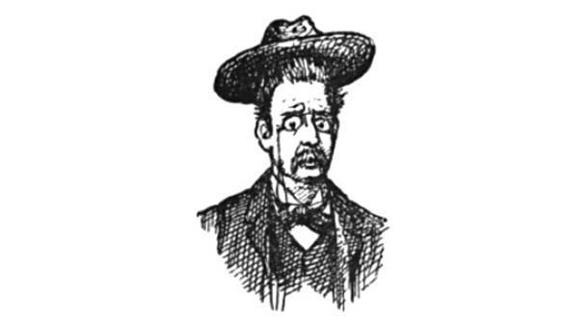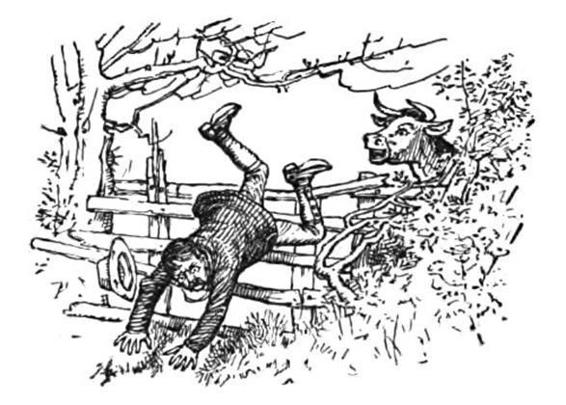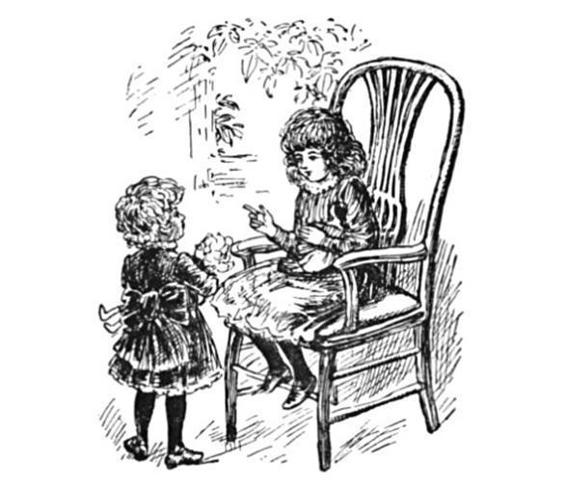Delphi Complete Works of Jerome K. Jerome (Illustrated) (Series Four) (391 page)
Read Delphi Complete Works of Jerome K. Jerome (Illustrated) (Series Four) Online
Authors: Jerome K. Jerome

But as I was preparing to drop down, the thought struck me: Was it
all
beasts that felt this way when they saw a man shamming dead, or was it only lions and tigers? I could not call to mind any instance of a traveler having escaped from a Jersey cow by this device; and to lie down in front of the animal, if it were merely going to take advantage of your doing so to jump on you, seemed unwise.
Then, too,
how about getting up again?
In the African desert, of course, you wait until the animal has gone home; but, in this case, the cow
lived
in the field, and I should have to go on pretending to be dead for perhaps a week!
No; I would try the power of the human eye. The human eye has a very wonderful effect upon animals, so I have been informed. No animal can bear its steady gaze. Under its influence a vague sense of terror gradually steals over the creature’s senses; and after vainly battling for a while against its irresistible power, the animal invariably turns and flies.
So I opened my right eye to its fullest extent, and fixed it hard upon that unfortunate cow.
“I will not unduly terrify the poor thing,” I said to myself. “I will just frighten her a little, and then let her go; and I will, afterward, return the way I came, and not needlessly pain her by crossing the field any farther.”

But what appeared so extraordinary to my mind was that the cow showed no signs of alarm whatever. “A vague sense of terror” began to gradually — I may say rapidly — steal over one of us, it is certain; but that one was not the cow. I can hardly expect any one to believe it; but as a matter of fact the cow’s eye, fixed with an intensely malevolent expression upon myself, caused more uneasiness to me than did my eye to the cow!
I glared at her harder than ever. All my feelings of kindly consideration toward the brute were gone, I should not have minded now if I had sent her into fits.
But she bore up under it. Nay, she did more. She lowered her head, slung up her tail stiff at right angles to her back, and, roaring, made toward me.

Then I lost all faith in the power of the human eye, and tried the power of the human leg; and reached the other side of the fence with the sixteenth of a second to spare.
No; it is not well to rule one’s self by theories. We think, when we are very young, that theories, or “philosophies” as we term them, are guiding lights, held out by Wisdom over the pathway of life; we learn, as we grow older, that, too often, they are mere will-o’-the-wisps, hovering over dismal swamps where dead men’s bones lie rotting.
We stand with our hand upon the helm of our little bark, and we gather round us in a heap the log-books of the great dead captains that have passed over the sea before us. We note with care their course; and, in our roll of memory, we mark their soundings, and we learn their words of counsel, and their wise maxims, and all the shrewd, deep thoughts that came to them during the long years they sailed upon those same troubled waters that are heaving round us now.
Their experience shall be our compass. Their voices, whispering in our ear, shall be our pilot. By the teaching of their silent lips will we set our sails to the unseen wind.
But the closer we follow the dog-eared logs, the wilder our poor craft tosses. The wind that filled the sails of those vanished ships blew not as blows the wind that strains our masts this day; and where they rode in safety, we run aground on reefs and banks, and our quivering timbers creak and groan, and we are well-nigh wrecked.
We must close those fading pages. They can teach us to be brave sailors, but they cannot tell us how to sail.
Over the sea of Life each must guide the helm for himself; and none can give us aid or counsel, for no one knows, nor ever has known, the pathway over that trackless ocean. In the heavens above us shines the sun, and when the night falls, the stars come forth; and by these, looking upward, we must steer, and God be with us on the waters.
For the sea of Life is very deep, and no man knows its soundings, and no man knows its hidden shoals and rocks, nor the strong currents flowing underneath its sunny surface; for its sands are ever shifting, and its tides are ever varying, and for the ships upon its waves there is no chart.
The sea of Life is vast and boundless, and no man knows its shores. For many thousand ages have its waters flowed and ebbed, and ever, day by day, from out the mist have come the little ships into the light, and beckoned with their ghost-like sails, and passed away; and no man knows from whence they came, and no man knows the whither they have gone. And to each ship it is an unknown sea, and over it they sail to reach an unknown land; and where that land lies none can tell.
The sailors that have gone before! who are they, that we should follow them? For a brief day they have lain tossed upon the heaving waters; for a short hour they have clung to their poor bark of Time; and on the restless current it has drifted, and before the fitful wind it has been wafted, and over the deep they have passed into the darkness and never more have they returned, and never more, though eyes, washed clear with bitter tears, have strained to pierce the gloom, have they or their frail ships been seen. Behind them the waters have closed up, and, of the way they went, there is no trail. Who are they, that they should draw a chart of this great ocean, and that we should trust to it?
What saw they of the mighty sea, but the waves lapping around their keel? They knew not the course they had sailed; they knew not the harbor that they sought. In the night they foundered and went down, and its lights they never saw.
The log of their few days’ cruise, telling the struggles and dangers of their ship as it sailed, among so many myriad others, let us read and learn from; but their soundings of this fathomless sea, their tracings of its unseen shores, of what value are they, but as guesses to riddles whose answers are lost? Do moles draw maps of the world for the guidance of other moles?
In all things do we not listen too much to the voices of our brothers, especially in those matters wherein they are least able to instruct us? Is there not in the world too much pulpit-preaching of this doctrine, and too much novel and essay-writing against that, and too much shrieking out of directions to this truth and of warnings against that; SO that, amid the shrieking and the thumping of so many energetic ladies and gentlemen, the still, low voice of God himself, speaking to our souls, gets quite drowned?
Ever since this world was set a-spinning we have been preaching and lecturing, and crusading and pamphleteering, and burning and advising each other into the way to go to Heaven; and we are still hard at it, and we are still all rushing about as confused and bewildered as ever, and nobody knows who is right, but we are all convinced that everybody else is wrong!
“This way, that way, not the other way!” we cry. “Here is the path, the only path; follow me, unless you wish to be lost!”
“Follow him not! He is leading you wrong!” says another. “I alone know the way!”
“No, no; heed neither of them!” says a third. “
This
is the road! I have just found it. All the roads men have gone by before have led them wrong; but we shall be all right now: follow me!”
In one age, by sword and fire, and other kinds of eloquent appeal, we drive men up to heaven through one gate, and in the next generation we furiously chase them away from that same gate; for we have discovered that it is a wrong gate, and leads, in fact, to perdition, and we hurry them off by another route entirely.
So, like chickens in a dusty highway, we scuttle round and round, and spin about and cry, and none of us knows the way home.
It is sincerely to be hoped that we do all get to this heaven one day, wherever it may be. We make hullaballoo enough about it, and struggle hard enough to squeeze in. We do not know very much what it is like. Some fancy it is an exhibition of gold and jewels; and others, that it is a sort of everlasting musical “At Home.” But we are all agreed that it is a land where we shall live well and not do any work, and we are going to have everything our own way and be very happy; and the people we do not like will not be allowed in.
It is a place, we have made up our minds, where all the good things of the other world are going to be given away; and, oh, how anxious we all are to be well to the front there!
Perhaps there are others, though, not of the piously self-seeking crew, to whom heaven only means a wider sphere of thought and action, a clearer vision, a nobler life, nearer to God; and these walking through the darkness of this world “stretch lame hands of faith and grope,” trying to find the light. And so many are shouting out directions to them, and they that know the least shout the loudest!
Yes, yes, they are clever and earnest, these shouters, and they have thought, and have spoken the thought that was in them, so far as they have understood it themselves; but what is it all, but children teaching children? We are poor little fatherless brats, left to run wild about the streets and alleys of this noisy earth, and the wicked urchins among us play pitch-and-toss, or marbles, and fight; and we quiet ones sit on a doorstep and play at school, and little ‘Liza Philosophy and Tommy Goodboy will take it in turn to be “teacher,” and will roar at us, and slap us, and instruct us in all they have learnt. And, if we are good and pay attention, we shall come to know as much as they do: think of that!
Come away — Come away from the gutter and the tiresome game! Come away from the din! Come away to the quiet fields, over which the great sky stretches, and where, between us and the stars, there lies but silence; and there, in the stillness, let us listen to the voice that is speaking within us!
Hark to it, O poor questioning children; it is the voice of God! To the mind of each of us it speaks, showing the light to our longing eyes, making all things clear to us, if we will but follow it. All through the weary days of doubt and terror, has it been whispering words of strength and comfort to our aching heart and brain, pointing out the path through the darkness to the knowledge and truth that our souls so hunger for; and, all the while, we have been straining our ears to catch the silly wisdom of the two-legged human beings that cackle round us, and have not heeded it! Let us have done with other men’s teaching, other men’s guidance. Let us listen to
ourselves
. No, you cannot tell what you have taught to othrs. That is what so many are trying to do. They would not understand you, and it would only help to swell the foolish din. The truths he has taught to us, we cannot teach to our fellow-men: none but God himself can speak their language, from no other voice but his can they be heard—”The Lord is in his holy temple, let all the earth keep silence before him!”
The serious and the comic seem to be forever playing hide-and-seek with one another in and out our lives, like light and shadow through an April day; and oftimes they, as children in a game, catch one another and embrace, and, with their arms entwined, lean for a space upon each other before the case begins afresh. I was walking up and down the garden, following out this very idea — namely, of the childishness of our trying to teach one another in matters that we know so little of ourselves — when, on passing the summer-house, I overheard my argument being amusingly illustrated by my eldest niece, aged seven, who was sitting very upright in a very big chair, giving information to her younger sister, aged five, on the subject of “Babies: their origin, discovery, and use.”
